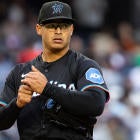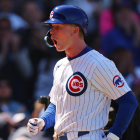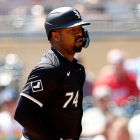Two years ago this month, the New York Yankees were in a difficult spot. On the morning of July 27, 2016, the Yankees were 52-48 and four games back of the second wild-card spot with three teams ahead of them in the standings. The Yankees had been hovering right around .500 all season.
Then, over the next four days, the Yankees lost four times to drop to 52-52 on the season. Among those four losses were a three-game sweep at the hands of the Tampa Bay Rays, a team that was 39-61 at the start of the series. That series against the Rays is what prompted the Yankees to sell at the 2016 deadline.
"A true playoff contender, you know, not a playoff pretender, wouldn't do that," said Yankees GM Brian Cashman to ESPN New York's Andrew Marchand, referring to getting swept by the Rays.
Andrew Miller was traded, Carlos Beltran was traded, and Ivan Nova was traded. The Yankees, a perennial contender for two decades and a postseason team as recently as 2015, accepted their mediocrity and sold at the deadline in an effort to build a better tomorrow. Those moves at the 2016 deadline have helped the 2018 Yankees post baseball's second-best record (67-37).
The 2018 Washington Nationals are in a similar spot as the 2016 Yankees leading up to the July 31 trade deadline. They are 52-53 and six games back of a postseason spot, giving us 105 games worth of evidence that the Nationals are a mediocre ballclub. Their plus-38 run differential paints a rosier picture than their 52-53 record, but, at the end of the day, win-loss record is what determines who goes to the postseason.
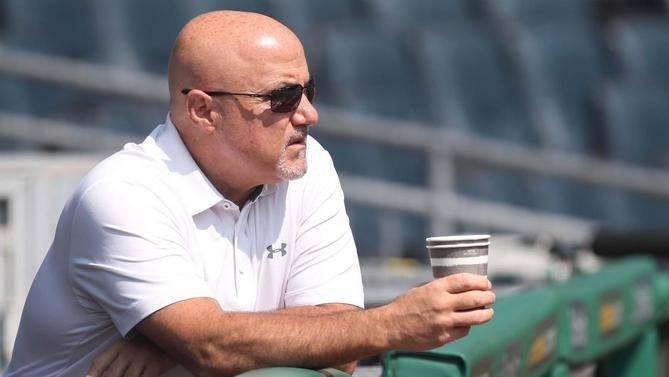
Last week it was reported the Nationals have begun preparations for a trade deadline sell-off, though GM Mike Rizzo reportedly remained on the fence. That's understandable. The Nationals are two-time defending NL East champs and they've gone to the postseason four times in the last six years. They have a win now core and Rizzo wants to, well, win now.
This past weekend's four-game series with the lowly Miami Marlins, a team not even pretending to contend this year, provided the Nationals with a perfect opportunity to get back into the postseason race. Beat up on a bad team, gain some ground, and give Rizzo not just a reason not to sell at the deadline, but even buy.
Instead, the Nationals split the four games with the Marlins. They won the first two games and everything seemed to be going according to plan. The Nationals then lost Saturday and Sunday, scoring one run total in the two games against a Marlins team that has allowed the sixth most runs in baseball.
J.T. Realmuto's walk-off single on Saturday, which blooped just inside the right field foul line and had Bryce Harper openly campaigning for a Realmuto trade after the game, felt like the death knell for the 2018 Nationals.
Much like the Yankees getting swept by the Rays prior to the 2016 trade deadline, the 2018 Nationals declared themselves playoff pretenders this weekend against the Marlins. They failed at the most basic of tasks required of a contender: Beat up on a bad team when your back is up against the wall. And they couldn't do it.
The Nationals have an off-day Monday, so Sunday's loss was the team's final game before the 4 p.m. ET trade deadline Tuesday. If Rizzo is still on the fence about selling, he shouldn't be. His team told him everything he needs to know this weekend. They are a thoroughly mediocre .500 club that has given Rizzo no reason to believe they can go on the kind of second half run that'll be required to reach the postseason.
It is important to note here that selling at the trade deadline does not equal a complete tear down and rebuild. The Nationals have a very strong core, one that could have the team right back in contention next season. Even if Harper leaves as a free agent, the Nationals will still have Max Scherzer, Stephen Strasburg, Trea Turner, Anthony Rendon, and Juan Soto to build around, not to mention top prospect Victor Robles. Pretty great core!
For this current Nationals team, selling at the trade deadline should mean trading away impending free agents, at the very least. Perhaps an under control player like Adam Eaton or Tanner Roark could draw a trade offer that is too good to turn down. Otherwise, moving impending free agents is the bare minimum. It should be done The team's impending free agents:
- 1B/OF Matt Adams
- LHP Gio Gonzalez
- OF Bryce Harper
- RHP Jeremy Hellickson
- RHP Kelvin Herrera
- RHP Shawn Kelley
- RHP Ryan Madson
- IF Daniel Murphy
- 1B Mark Reynolds
- C Matt Wieters
Hellickson and Reynolds have minimal trade value -- both players signed with the Nationals well after the start of spring training -- so trading them for a prospect isn't realistic. Murphy and Wieters missed big chunks of the season with injuries and haven't looked like themselves at all since returning. They may be August trade candidates more than July 31 trade candidates, once they get their legs under them and start to produce.
The rest of the free agents have value. Herrera would be in very high demand because dominant late-inning relievers are always in high demand at the trade deadline. Contenders can't get enough of them. At the very least, the Nationals may be able to recoup something on par with the three-prospect package they traded to the Kansas City Royals to get Herrera a few weeks ago. Teams are always looking for starters, so moving Gonzalez should be easy. Madson and Kelley can help contending teams, and surely some team will send Washington a prospect for Adams and his 136 OPS+.
Harper is, clearly, a special case. He is on the very short list of the most talented baseball players on the planet, though he is having a down season by his standards. Keep in mind a down season for Harper still features a .369 on-base percentage, 25 home runs, and a National League leading 84 walks. Harper has been quite productive this year. Just not as productive as he has been the last few years.
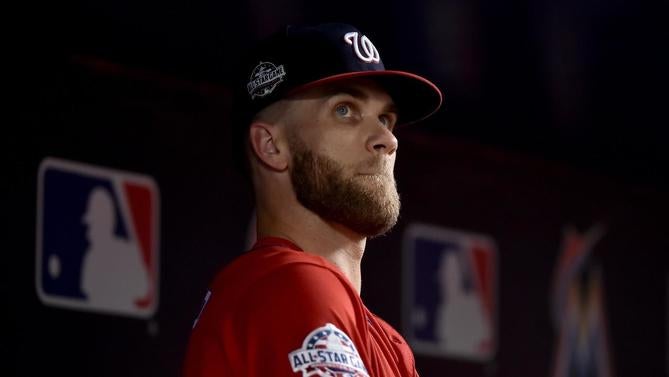
Surely the Nationals will attempt to re-sign Harper after the season. How aggressively will they pursue him? That remains to be seen, but reports indicate the Lerner family loves Harper, and when ownership loves a player, they tend to do what they can to keep him. Trading Harper and re-signing him after the season is a solid plan -- the Yankees did exactly that with Aroldis Chapman in 2016 -- though it is risky. As soon as you trade away a player, your chances of re-signing him slip because you've eliminated any sense of loyalty, and given him a taste of life elsewhere. Look at Jon Lester and the Boston Red Sox.
If the Nationals did put Harper on the market, I'm sure there would be plenty of interest even with his down season. The Philadelphia Phillies figure to get involved. The Houston Astros have not gotten much production from left field at all this season. The Yankees just lost Aaron Judge for a few weeks with a wrist fracture. I wouldn't rule out the Los Angeles Dodgers, Chicago Cubs, or even the outfield needy Cleveland Indians here either.
Trading Harper is very much a special case because 25-year-old players with this much talent do not become available often. Washington's other rentals, like Herrera and Madson and Adams, are not special cases. They are exactly the kind of players non-contenders trade at the deadline, and the Nationals are a non-contender. They showed us this weekend. The Nationals blew their chance to give everyone a reason to believe in this team.
Rizzo and the Nationals should cash in those rentals at the deadline with the goal of building organizational depth and creating roster flexibility. Again, the Nationals have a strong core locked in for next season even without Harper. The goal is building depth and adding strong complementary players around that core. The 2016 Yankees, truth be told, were in worse shape than the 2018 Nationals. Judge, Gary Sanchez, and Luis Severino hadn't established themselves yet. The Nationals know who their core is already. The hard part is over. This is a team that can be turned around quickly.
Barring a miracle run in the second half, the Nationals will go down as the single most disappointing team in baseball this season. They were a bona fide World Series contender coming into 2018, and instead, they continue to hover around .500 and Rizzo is considering selling at the trade deadline. He shouldn't consider it any longer. He should do it. The Nationals had their chance to make a move this weekend, they didn't, and now the front office should act accordingly and focus on the future rather than the present.


















